 This
four-song EP, Wrecked, from unknown
vocalist Mandalyn just happened to show
up in my mailbox one day. I put it into my pile
of CDs to consider for review, not getting to it
for several weeks. I don't even remember who
sent it to me, and my expectations for it were
pretty low.
This
four-song EP, Wrecked, from unknown
vocalist Mandalyn just happened to show
up in my mailbox one day. I put it into my pile
of CDs to consider for review, not getting to it
for several weeks. I don't even remember who
sent it to me, and my expectations for it were
pretty low.
Man, was I ever wrong about this
one! I still don't know a whole lot about
Mandalyn, other than that she is a classically
trained singer, but the four songs on Wrecked
have whetted my appetite for more. It's
powerhouse soulful blues from a dynamic vocalist
with a good future ahead of her. Recorded in
Nashville, the EP was produced by Tony "TC"
Coleman (former B.B. King drummer), who leads a
solid band of Bart Walker (guitar), Brian Allen
(bass) and Frank Ray (keyboards).
Opening the EP is the title cut,
a slow soulful masterpiece that showcases
Mandalyn's powerful, octave-bending voice. She
shows her raw emotion early on and continues to
inject even more energy into her vocals as the
song progresses. Another original composition is
"Baby On The Run," a mid-tempo soul number
that's both eerie and spooky, with staccato
notes coming from Mandalyn's voice while Walker
lays down some interesting guitar licks later in
the song.
"Feel Like Breakin' Up
Somebody's Home" has been often covered since it
was a hit nearly 50 years ago for Ann Peebles,
but Mandalyn redefines this soul/blues classic
with her sassy vocals. The horn section of
Varney Greene (trombone), Joshua Harner
(trumpet) and Mickey Guitierrez (sax) joins the
band to give this version the appropriate brassy
sound. The Lieber-Stoller composition, "I Who
Have Nothing," is intro'd with jazzy piano from
Ray before Mandalyn comes in on vocals in front
of an orchestral arrangement/ This
inspirational love song has been covered by a
diverse set of artists, from Joe Cocker to Ben E.
King to Shirley Bassey to Tom Jones, and we can
now add Mandalyn's name to list of singers who
have killed it.
Make a note of this name right
now --- Mandalyn --- she's got a chance
to be a star. I can't wait to hear more from
this exciting new artist.
--- Bill Mitchell
 Coming
out of the Memphis area is a very fine disc,
The Coldwater Sessions (VizzTone), from
singer / harmonica player JD Taylor, who
is known for his work as the leader of the band
Little Boys Blue. Taylor and his backing band,
plus special guests, headed down the road from
Memphis to the Zebra Ranch Studio in North
Mississippi, near the town of Coldwater, thus
the name of the album. It's bluesy, soulful and
gritty, with all 11 cuts being top-notch stuff.
Taylor can blow his harp with the best of them,
and while his voice doesn't have a lot of power
it easily adapts to the range of material that
he covers.
Coming
out of the Memphis area is a very fine disc,
The Coldwater Sessions (VizzTone), from
singer / harmonica player JD Taylor, who
is known for his work as the leader of the band
Little Boys Blue. Taylor and his backing band,
plus special guests, headed down the road from
Memphis to the Zebra Ranch Studio in North
Mississippi, near the town of Coldwater, thus
the name of the album. It's bluesy, soulful and
gritty, with all 11 cuts being top-notch stuff.
Taylor can blow his harp with the best of them,
and while his voice doesn't have a lot of power
it easily adapts to the range of material that
he covers.
All but one of the songs on
The Coldwater Sessions are original
compositions. It's obvious that Taylor was
influenced by Jimmy Reed since I had to keep
double-checking the songwriting credits to make
sure that the raw blues numbers "Got You Where
You Want Me" and "Honey Honey Baby," as well as
the very Junior Wells-sounding "Ooh Wee,"
weren't covers. The latter number mixes a
Chicago blues sound with a taste of James Brown
influence, not incongruous since Junior Wells
was highly influenced by the soul hit makers of
the day. Guitarist Jon Hay even sounds like he
could have played the same parts on an early
James Brown album.
Taylor and the band easily
transition back and forth between blues and
soul, with a big horn section joining on the
soulful "Nothing Left To Say." I'm impressed
with Taylor's vocal work on these soul numbers,
notably the slower numbers like "Nothing Left To
Say" and "At First Glance." The band is also
capable of getting funky, with the horns
providing the intro to "It Ain't No Good" while
guitarist Jon Holiday provides some nice B.B.
King-style guitar.
For even more variety in
material,
the band occasionally moves into more of a jump blues sound,
like on the up-tempo "Hanging On," with Hay
putting down some killer guitar licks and Taylor
jumping in with solid harmonica accompaniment.
Taylor switches over to the chromatic harp and Hay
lays down an exquisite Texas blues guitar solo
on the closing instrumental, "The Coldwater
Swing."
Adding an extra spice to this
very fine album are backing vocals by a couple
members of the Southern Avenue band out of
Memphis, as well as Hammond B-3 accompaniment
from the legendary Rev. Charles Hodges.
The Coldwater Sessions is
a very strong album, likely to wind up on
multiple Top Ten lists for the year. Kudos to JD
Taylor and all of the musicians that joined him
on the trek to Mississippi to record this gem.
--- Bill Mitchell
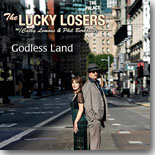 San
Francisco ensemble The Lucky Losers are
fronted by singer Cathy Lemons and harmonica
player / vocalist Phil Berkowitz. Their latest
album, Godless Land (VizzTone), was
recorded at Kid Andersen's Greaseland studio and
is a mixture of various blues styles that give
both Lemons and Berkowitz the chance to step to
the front of the stage. It's a decent album,
with some outstanding numbers and then some that
just didn't grab me. The backing band of Ian
Lamson (guitar), Chris Burns (keyboards), Endre
Tarczy (bass) and Derrick "D'Mar" Martin (drums)
is solid, and a few guests work their way into
the mix during the session.
San
Francisco ensemble The Lucky Losers are
fronted by singer Cathy Lemons and harmonica
player / vocalist Phil Berkowitz. Their latest
album, Godless Land (VizzTone), was
recorded at Kid Andersen's Greaseland studio and
is a mixture of various blues styles that give
both Lemons and Berkowitz the chance to step to
the front of the stage. It's a decent album,
with some outstanding numbers and then some that
just didn't grab me. The backing band of Ian
Lamson (guitar), Chris Burns (keyboards), Endre
Tarczy (bass) and Derrick "D'Mar" Martin (drums)
is solid, and a few guests work their way into
the mix during the session.
Lemons shines on vocals on the
opening number, her own composition, "Half A
Nothing." It's got a classic soul sound with
Lemons shouting out sassy vocals, while
Berkowitz comes in with a really strong harp
solo and also contributes vocals. Having both
singers sharing vocals on the same song happens regularly on
Godless Land, such as the up-tempo "No Good
Lover," a frantic, up-tempo blues that has the
two singers going at each other. It was a hit in
1956 for Mickey & Sylvia, and Lemons and
Berkowitz turn in a nice version.
One of the more intriguing cuts
is the Doc Pomus / Mac Rebennack composition,
"Be You," standing out for Andersen's use of a
sitar to create a rather unique sound to this
tune. Another well-chosen cover is the old-timey
mid-tempo blues, "What Makes You Act Like That,"
with Andersen taking the guitar leads with
really nice acoustic picking just like Lonnie
Johnson did on the original.
While I much prefer Lemons'
vocals throughout the album, Berkowitz does a
respectable job on the slow blues original, "The Good
Fight," which he co-wrote with Danny Caron. The
horn section of Michael Peloquin (sax) and Mike
Rose (trumpet) stand out here. Lemons shines on
her own song, "Leave You On The Side Of The
Road," a driving song with an infectious beat.
Burns is showcased with some wonderful piano
playing on the mid-tempo blues shuffle, "Catch
Desire By The Tail."
While not everything on
Godless Land was up to par with its best
numbers, there's enough good stuff here to
keep this album in the "recommended" category.
--- Bill Mitchell
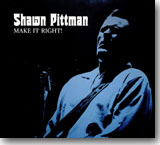 It's been way too long since
I've acquired a CD from Shawn Pittman,
with my other albums by the Oklahoma native
dating back to 1998 and 2001 when the young
guitar slinger was based
in Texas. He's recorded intermittently since
then, while also moving back home to his home
state and taking the time to earn a degree in
Information Technology (now that's a cool
factoid!).
It's been way too long since
I've acquired a CD from Shawn Pittman,
with my other albums by the Oklahoma native
dating back to 1998 and 2001 when the young
guitar slinger was based
in Texas. He's recorded intermittently since
then, while also moving back home to his home
state and taking the time to earn a degree in
Information Technology (now that's a cool
factoid!).
After one of his
sabbaticals from the music biz Pittman headed
across the pond for a European tour and took
advantage of a couple of off-days to do some
recording in a Copenhagen, Denmark studio along
with the father and son combo of Erkan Özdemir
(bass) and Levent Özdemir (drums). The result is
the solid blues disc, Make It Right
(Continental Blue Heaven). It's a dozen cuts of
good rockin' blues with a real "live in the
studio feel," making me happy that Pittman
is still around and putting out great
music.
All 12 cuts are solid, but the
one that really caught my ear was when Pittman
takes the listener to the Mississippi Hill
Country with Junior Kimbrough's mid-tempo raw
blues "I Feel Good." He especially gets that
Delta sound in his voice here, as he does on a
slower version of a Jimmy Reed composition, "Let
It Go." The tone that Pittman got from "Let It
Go" was attributed to a pieced together
Telecaster with an Esquire neck and a neck
pickup from a '50s Kay. (Note: Guitar gearheads will want to have the
physical CD in order to read the liner notes to
find out about the various
guitars used in the session by Pittman).
Pittman gets funky on the Eddie
Taylor number, "There Will Be A Day," putting
out some of his hottest guitar solos on the
album. He used a Jimmie Vaughn Tex-Mex Strat on
a killer instrumental version of James Brown's
"Cold Sweat," as well as when he summons his
inner T-Bone Walker on the Bobby Bland blues
shuffle, 'Woke Up Screaming," and on Albert King's
"Finger On The Trigger."
While he's better known as a
guitarist, Pittman can pack a wallop of soul and
raw emotion into his vocals, best heard on the
slow minor-key blues original, "How Long?" "Make
It Right" is a raucous, up-tempo blues with
plenty of echo in his vocals and reverb in the
guitar effects.
While it's not like he
disappeared off the face of the earth, Make
It Right is the first Shawn Pittman album to
make it to my mailbox in quite some time.
Welcome back, Shawn, welcome back.
--- Bill Mitchell
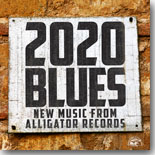 Judging
from the quality of the five songs on 2020
Blues, a sneak preview of albums being
released by Alligator Records over the next few
months, it's very likely that the iconic blues
label is likely to be dominating our Blues Bytes
Pick Hit feature in the near future. And it's
obvious that at least some of their artists are
not reluctant to voice their opinion about the
current toxic political environment in the
United States, and that's a good thing.
Judging
from the quality of the five songs on 2020
Blues, a sneak preview of albums being
released by Alligator Records over the next few
months, it's very likely that the iconic blues
label is likely to be dominating our Blues Bytes
Pick Hit feature in the near future. And it's
obvious that at least some of their artists are
not reluctant to voice their opinion about the
current toxic political environment in the
United States, and that's a good thing.
2020 Blues contains one
cut each from upcoming albums by Chris Cain (his
Alligator debut), Selwyn Birchwood, Shemekia
Copeland, Curtis Salgado, and the combo of Elvin
Bishop & Charlie Musselwhite.
Copeland's contribution, the
title cut of her Uncivil War album, will
very likely be a strong contender for Song of
the Year. Backed by very tasteful acoustic
accompaniment, Copeland packs a whole lot of
emotion into her vocals as she sings about the
divide in our country, "... the same old
wounds we opened before, nobody wins in an
uncivil war ..." It's a passionate plea for
peace among ourselves and a desire for us to all
work together. Maybe we'll get there in 2021.
Bishop also doesn't hide his
political beliefs on "What The Hell?," as in no
uncertain terms he voices his criticism of the
current administration and what it's done to the
nation, "...I want to know how could a good
thing go so wrong, half the people in the
country can't stand the other half ..."
Cain sticks to his common
songwriting theme of love gone wrong on "I
Believe I Got Off Cheap," a mid-tempo blues with
his deep, powerful voice booming out the blues
about his escape from the wrong woman in his
life. Birchwood, who turned into one of my
personal faves with his two previous 'Gator
discs, follows the same basic lament about his
love life on "Living In A Burning House."
Salgado gives an upbeat song about the fact that
he wants to keep going, with his soulful gospel-ish
vocals singing, "...The longer I live, the older
I want to get ..."
This sampler will be available
in mid-August on all popular streaming sites,
and you'll want to download it even if you plan to
eventually acquire each of the individual discs
when released.
--- Bill Mitchell
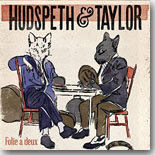 The duo Hudspeth & Taylor consists of
Kansas City blues vets Brandon Hudspeth (guitar)
and Jaisson Taylor (vocals, percussion). Though
the pair have known each other for 20 years,
they only began their collaboration about five
years ago, when Hudspeth was asked to put
together a duo which evolved into a weekly gig.
After a year, it evolved to an acoustic setting,
with Hudspeth providing all the guitar work and
Taylor supplying his warm, lived-in vocals and
innovative percussion work. Their debut
recording, Folie a Deux, captures their
approach in 13 compelling tracks.
The duo Hudspeth & Taylor consists of
Kansas City blues vets Brandon Hudspeth (guitar)
and Jaisson Taylor (vocals, percussion). Though
the pair have known each other for 20 years,
they only began their collaboration about five
years ago, when Hudspeth was asked to put
together a duo which evolved into a weekly gig.
After a year, it evolved to an acoustic setting,
with Hudspeth providing all the guitar work and
Taylor supplying his warm, lived-in vocals and
innovative percussion work. Their debut
recording, Folie a Deux, captures their
approach in 13 compelling tracks.
The upbeat “Big Fat Hairy Lie”
opens the disc and we get a dose of Taylor’s
smooth vocals with this track, backed with
Hudspeth’s slide guitar. The Delta-flavored
“Walking Down The Road” is a real Jimmy
Reed-like toe-tapper, and the driving boogie
track “I’ll Be Right Back” is irresistible fun.
The haunting ballad “I Know It’s Gonna Rain
Again” takes it’s sweet time and it’s well worth
it. Hudspeth’s guitar work is almost hypnotic in
its allure. The jaunty “Candy Man” (not the song
associated with Mississippi John Hurt) ventures
into Piedmont blues territory, while the “Silly
Billy” gives a nod to Django Reinhardt’s guitar
style.
The album’s lone cover is a
lively read of the late K.C. blues man Provine
Hatch’s (a.k.a. Little Hatch) “Rock With Me
Baby.” “Low Down Dealer Man” is about a shady
card dealer, and the humorous “Sometimes You Act
Crazy” takes a look at a moody significant other
(yes, there are some out there). The title track
is a Piedmont-based instrumental with some
dexterous fingerpicking from Hudspeth, and
“Future” is a Hooker-esque boogie. “When You
Comin’ Home” is a nice country blues, and the
closer, “Daddy Baby,” features Taylor’s driving
percussion and vocals sung in unison with
Hudspeth’s electric slide.
Folie a Deux is a
masterful set of mostly acoustic blues that
features fine songwriting from Hudspeth and
Taylor as well as superlative instrumental work.
Hopefully, these talented artists will continue
to collaborate for years to come.
--- Graham Clarke
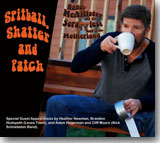 You have to admire Randy
McAllister’s approach to the blues. His
songwriting is top notch as he covers life’s
everyday occurrences with the right mix of grit,
tenacity, determination and humor. He’s a
powerful vocalist and harmonica player, even
playing drums on some tracks.
You have to admire Randy
McAllister’s approach to the blues. His
songwriting is top notch as he covers life’s
everyday occurrences with the right mix of grit,
tenacity, determination and humor. He’s a
powerful vocalist and harmonica player, even
playing drums on some tracks.
McAllister also turns in an
excellent album every couple of years, combining
the above elements with an impressive list of
musicians in support (dubbed “The Scrappiest
Band In The Motherland”). His most recent
release carries the intriguing title
Spitball, Shatter and Patch (Reaction
Records), and offers ten equally intriguing
original tracks.
The opener, “Relax Watch The
Crash,” is a laidback roots tune that reflects
on handling things beyond our control. Brandon
Hudspeth adds slide guitar, Bill McKemy provides
tuba, and Heather Newman guests on background
vocals. Hudspeth’s slide and McAllister’s harp
both figure prominently on “The Loudest
Chicken,” which is a wild rocker, then a blues
shuffle, then a rocker once again.
Newman returns for backing
vocals on “My Drawl Caused It All,” a humorous
southern rocker that we folks who live south of
the Mason-Dixon Line can relate to. I really
like Hudspeth’s guitar on this track and several
others, reminding me a lot of Sonny Rhodes’ lap
steel.
On the acoustic “Kingsland,”
McAllister turns in a supremely soulful vocal,
backed by understated harmonica and guitar. The
rollicking “Rolling Up My Sleeves” features more
great Hudspeth guitar, and the mid-tempo
“Straight Up Truckin’” combines the blues and
soul as well as you’ll ever hear. At least until
you hear the next song, “The Song That Writes
Itself,” a song like they used to do ‘em that
describes one’s bad decisions returning with a
vengeance. “Pactola” combines rock, soul, and
funk, with more of that great slide guitar to
boot.
“Laid Back Jack” returns to that
front porch acoustic Delta groove, and the
closer, “The Girl’s In Love (With Herself),” is
a driving blues rocker that wraps the disc up
nicely. In addition to the contributions from
Hudspeth, Newman, and McKemy, McAllister gets
mighty strong rhythm support from Cliff Moore
(bass) and Adam Hagerman (drums).
Anytime you hear a Randy
McAllister album you know you’re going to get
maximum effort, with superb songwriting and
performances from all involved. Spitball,
Spatter and Patch needs no touch-ups at all
--- it’s great as is!!
--- Graham Clarke
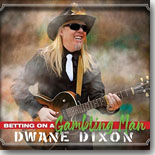 For his third release,
Betting on a Gambling Man, Canadian
singer/songwriter/guitarist Dwane Dixon
decided to just do everything. He wrote all of
the songs, produced the album, and played all of
the instruments (guitar, bass, drums, keyboards,
and harmonica). Dixon started playing the blues
in 2013 and has become a fan favorite in eastern
Canada with his classic roadhouse blues rock
approach.
For his third release,
Betting on a Gambling Man, Canadian
singer/songwriter/guitarist Dwane Dixon
decided to just do everything. He wrote all of
the songs, produced the album, and played all of
the instruments (guitar, bass, drums, keyboards,
and harmonica). Dixon started playing the blues
in 2013 and has become a fan favorite in eastern
Canada with his classic roadhouse blues rock
approach.
The rollicking title track kicks
off things, a biographical sketch of Dixon’s dad
and his love of gambling. “A World of Hurt”
takes on a Texas roadhouse rock theme, while
“Swallow That Pill” has a strong ZZ Top feel.
“Ain’t No Big Thing” leans more to the Southern
rock end of the spectrum with some impressive
slide guitar from Dixon. The acoustic “I Buried
Your Bones” blurs the line between blues and
country quite effectively, and the laidback
“Small Town Talking Blues” follows the same
musical path.
“Wanna Be Your Man” borrows
liberally from the melody of Howlin’ Wolf’s
“You’ll Be Mine,” but stands well on its own
merits thanks to Dixon’s guitar work and a
strong vocal. The wild swinging “Whisky You
Don’t Lie” is a lot of fun, and the closer, “The
Awakening,” is a spacey, rocking instrumental
giving Dixon ample room to put his guitar chops
on display.
Betting On A Gambling Man
is a relatively brief album at slightly under 37
minutes, but Dwane Dixon packs a lot of great
music into a short span of time. His standout
songwriting, singing, and guitar work will leave
listeners wanting to hear more. Blues rockers
will find much to enjoy with this release.
--- Graham Clarke
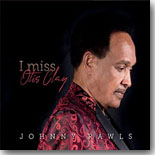 Despite the title, soul man
extraordinaire Johnny Rawls’ I Miss
Otis Clay (Third Street Cigar Records) is
not really a sad record at all. Rawls and Clay
were friends for over 40 years and finally
collaborated on the Soul Brothers album
in 2014, just before Clay passed away two years
later. The title track of the album is Rawls’
heartfelt tribute to the legendary singer. The
gospel/soul feel of the melody give it the feel
of a classic Clay track, and Rawls’ vocal is
strong yet wistful at his friend’s departure,
and you can almost see the late singer smiling
down from Heaven at his friend’s tribute.
Despite the title, soul man
extraordinaire Johnny Rawls’ I Miss
Otis Clay (Third Street Cigar Records) is
not really a sad record at all. Rawls and Clay
were friends for over 40 years and finally
collaborated on the Soul Brothers album
in 2014, just before Clay passed away two years
later. The title track of the album is Rawls’
heartfelt tribute to the legendary singer. The
gospel/soul feel of the melody give it the feel
of a classic Clay track, and Rawls’ vocal is
strong yet wistful at his friend’s departure,
and you can almost see the late singer smiling
down from Heaven at his friend’s tribute.
The album opens with the funky
soul of “California Shaking Again,” a sequel of
sorts to one of Rawls’ more popular songs,
“California Shake” from his 2017 album
Waiting For The Train. “Give A Toast To The
Blues” is a horn-drenched, soul/blues tribute to
some of the legends of the genre. “I Can’t Let
Nobody” and “Can’t Read Your Mind” both have a
solidly smooth Memphis soul / Hi Records variety
feel, with Rawls turning in an excellent
pleading vocal on the latter, while on “Giving
You Something You Can Feel” he turns on the
charm as he comes to the rescue of a woman
spurned.
The easy-flowing and buoyant
“Slow Roll It” and the sensual “Motion Of The
Ocean” should be dance floor pleasers, and the
catchy “Kissing and Hugging” is deep southern
soul at its finest. The reflective ballad, “The
Wind,” is the perfect closer, with Rawls’
honestly-delivered vocals making this track a
standout among standouts.
After nearly 20 albums and
almost a half century in the business, Johnny
Rawls’ talents are undiminished by time. His
silky, soulful vocals are as sharp as ever, and
he knows how to deliver a song as well as the
soul singers of the ’60s --- O.V. Wright, James
Carr, Z.Z. Hill, and Otis Clay --- who inspired
him. I think all of those legendary performers
would be proud of the man who’s carrying on
their name and their music. I Miss Otis Clay
ranks with the best work Johnny Rawls has
released.
--- Graham Clarke
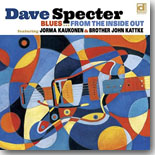 Blues From The Inside Out
is the latest release from guitarist Dave
Specter, who offers up a few surprises this
time around. Fellow guitarist Jorma Kaukonen of
Jefferson Airplane and Hot Tuna joins Specter on
two tracks for starters. Specter also sings for
the first time on this album, and most
impressively at that. The 12 tracks are all
originals by Specter, combining the blues with
jazz, soul, funk, and gospel, also featuring
vocal turns from Brother John Kattke on four
tracks and Sarah Marie Young on one track.
Blues From The Inside Out
is the latest release from guitarist Dave
Specter, who offers up a few surprises this
time around. Fellow guitarist Jorma Kaukonen of
Jefferson Airplane and Hot Tuna joins Specter on
two tracks for starters. Specter also sings for
the first time on this album, and most
impressively at that. The 12 tracks are all
originals by Specter, combining the blues with
jazz, soul, funk, and gospel, also featuring
vocal turns from Brother John Kattke on four
tracks and Sarah Marie Young on one track.
The reflective title track kicks
things off. Specter’s first vocal appearance
will make most fans wonder why he hasn’t taken
the mic on previous releases because of his
relaxed, assured delivery. He also delivers a
scathing boogie-fueled rebuke of the Commander
In Chief on “How Low Can One Man Go,” and lays
it on the line to a lover with a wandering eye
on “Asking For A Friend.” Keyboardist Kattke
ably handles vocal on the swampy, horn-driven
“Ponchatoula Way,” the soulful “March Through
The Darkness” (inspired by Mavis Staples), the
swinging “The Blues Ain’t Nothin’,” and the
Latin-flavored “Opposites Attract.” Ms. Young
gives a powerful, passionate performance on the
acoustic “Wave’s Gonna Come.”
Fans of Specter’s guitar work
shouldn’t panic though, because there’s plenty
of fantastic fretwork present on four tasty
instrumentals. The deliciously funky
“Sanctifunkious” is a nod to the Meters and the
Neville Brothers, while “Minor Shout” seamlessly
blends blues and jazz. Meanwhile, the splendid
“Soul Drop” is a marvelous musical mix with
Specter’s guitar, Kattke’s B3, and the Liquid
Soul Horns, and “String Chillin’,” is a smoky
after-hours album closer with Specter’s guitar
front and center.
Kaukonen makes his two
appearances on guitar count, and Specter’s
longtime cohorts – Harlan Lee Terson (bass) and
Marty Binder (drums) are at their best. There
are also guest appearances from Ruben Alvarez
(percussion), and Tad Robinson and Devin
Thompson (backing vocals). Blues From The
Inside Out ranks with Dave Specter’s best,
and it’s certainly his most diverse collection
with his vocal prowess very nearly matching his
superlative guitar skills.
--- Graham Clarke
 The Montreal-based band Fuel
Junkie recently issued their second album,
All Out, an explosive set of horn-driven
blues. The band features three, sometimes up to
seven, horns as they blend blues with soul, R&B,
and funk. Singer/songwriter/tenor saxophonist
Marc LeClerc is joined by fellow tenor Philippe
Brochu-Pelletier, baritone saxophonist Patrice
Luneau, guitarist Antoine Loiselle, bassist
Jean-François Charest, and drummer Philippe
Fleury. The band is augmented on five of the 11
tracks by Lex French and Andy King (trumpets)
and Jean-Nicolas Trottier and Olivier Lizotte
(trombones).
The Montreal-based band Fuel
Junkie recently issued their second album,
All Out, an explosive set of horn-driven
blues. The band features three, sometimes up to
seven, horns as they blend blues with soul, R&B,
and funk. Singer/songwriter/tenor saxophonist
Marc LeClerc is joined by fellow tenor Philippe
Brochu-Pelletier, baritone saxophonist Patrice
Luneau, guitarist Antoine Loiselle, bassist
Jean-François Charest, and drummer Philippe
Fleury. The band is augmented on five of the 11
tracks by Lex French and Andy King (trumpets)
and Jean-Nicolas Trottier and Olivier Lizotte
(trombones).
The album starts with a bang,
courtesy of the title track, an energetic R&B
track with all seven horns blasting away. “High
Stress, Low Money” has a funky New Orleans
bounce, as does the ballad “Can You Dig It,” on
which the band insists on playing the blues the
way they want to play them. “Bad Luck” is a
smoking blues ballad with crisp guitar work from
Loiselle, and the swinging “V-Twin” is a cool
love song. “Kiss In The Moonlight” is an
intense, stop-time blues, and “Hard Times” is a
soulful blues describing a relationship’s end.
The slow burner “Once Or Twice”
strikes a mournful tone, with a heartfelt vocal
from LeClerc, but the mood picks up quickly with
“Get Out On The Road.” The band rolls into the
brisk swinging instrumental “TorqueFlite” before
wrapping up with “Push Me Away,” a track that
shows the band is equally comfortable playing in
a heavy blues-rock vein.
All Out is a fun and
exciting set of swinging blues that will please
those who dig horn-fueled blues and R&B. Fuel
Junkie has a great sound, with fine songwriting
and excellent musicianship. Expect to hear more
from this ensemble.
--- Graham Clarke
 The Colorado-based Cass
Clayton Band combines the blues with rock,
soul, funk, and R&B so effortlessly that you
barely see the seam. Clayton has a powerful and
soulful voice that can rapidly move from tough
or tender, and her songwriting and slide guitar
work are equally first-rate. The 12 tracks (11
originals written by Clayton with
producer/guitarist Taylor Scott) on the band’s
latest release, Play Nice, touch on all
of the above-mentioned genres, but the roots are
firmly entrenched in the blues.
The Colorado-based Cass
Clayton Band combines the blues with rock,
soul, funk, and R&B so effortlessly that you
barely see the seam. Clayton has a powerful and
soulful voice that can rapidly move from tough
or tender, and her songwriting and slide guitar
work are equally first-rate. The 12 tracks (11
originals written by Clayton with
producer/guitarist Taylor Scott) on the band’s
latest release, Play Nice, touch on all
of the above-mentioned genres, but the roots are
firmly entrenched in the blues.
The opening track, “Dawes
County,” is a poignant Americana-flavored track
about returning to your hometown. “Little
Things” leans more toward the soul side of the
aisle with a solid, slightly funky groove, and
the mellow title track adds a bit of pop to the
soul mix, driven by Jon Wirtz’s Hammond C3,
while “B Side” is an R&B tune with lyrics that
give an interesting perspective to a romance.
“No Use In Crying” is a lively soul number, one
of several tracks that feature a horn section,
and Clayton’s vocal is particularly tender on
the ballad “Tattered And Torn.”
The up-tempo “You’ll See” is a
light and funky track, and “The Most Beautiful”
is a deep, reflective ballad that points out
that true beauty is not skin deep, featuring a
fantastic vocal from Clayton on this song.
“Doesn’t Make Sense” is a funky, stripped-down
cut that stretches out and takes its sweet time,
and “Flowers At My Feet” pulls out all the
stops, mixing the funk with a touch of rock and
soul. That leads into the short, simmering
instrumental “Slow Kiss.” The album finale is a
cover of Ted Hawkins’ “Strange Conversation,”
one of my favorite tracks from the late
singer/songwriter. Clayton’s vocal is superb and
a perfect fit for the song.
Play Nice is a most
excellent album, mixing blues with healthy dose
of soul, R&B, and funk. Cass Clayton has a voice
that will stay with listeners for a long time,
one of the most compelling to be heard these
days.
--- Graham Clarke
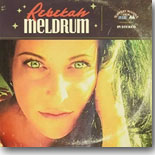 For singer Rebekah Meldrum,
the line between blues and gospel is a very thin
one. Growing up as a preacher’s daughter, she
was exposed to gospel music from a young age,
but at the age of eight she heard Koko Taylor
and her musical direction was set from that
point in time. She’s collaborated with guitarist
Paul Holdman for several years, releasing a
co-billed album in 2016 that was well-received.
On her most recent self-titled effort,
Rebekah Meldrum, Holdman is still in place
as co-writer and guitarist and he’s joined by
Tad Robinson, who provides harp and vocals on
several of the tracks, along with drummer Kevin
Kouts, bassist David Murray, a horn section (P.J.Yinger
– trumpet, Richard Dole – trombone) and
harmonica player Patrick Long.
For singer Rebekah Meldrum,
the line between blues and gospel is a very thin
one. Growing up as a preacher’s daughter, she
was exposed to gospel music from a young age,
but at the age of eight she heard Koko Taylor
and her musical direction was set from that
point in time. She’s collaborated with guitarist
Paul Holdman for several years, releasing a
co-billed album in 2016 that was well-received.
On her most recent self-titled effort,
Rebekah Meldrum, Holdman is still in place
as co-writer and guitarist and he’s joined by
Tad Robinson, who provides harp and vocals on
several of the tracks, along with drummer Kevin
Kouts, bassist David Murray, a horn section (P.J.Yinger
– trumpet, Richard Dole – trombone) and
harmonica player Patrick Long.
At seven songs and around 30
minutes, it’s a quick, but entertaining listen.
The opener, “Set Your Soul Free,” is a splendid
slow burner with a taste of the Mississippi
Delta, with Holdman’s shimmering guitar and
Robinson’s harp and Meldrum’s robust vocal.
“Whiskey and Wine” is a smooth after-hours
blues, and the ruminative “Far Away” is solid
soul-blues while “Ain’t Thinking Bout You” mixes
blues and jazz with funk.
“Gypsy” is an easygoing blues
tale of Molly Malone, a restless singer/dancer
who follows her muse from town to town. “Coat
Tails” revisits the funky groove with some tight
work from the rhythm section and Holdman with
Long on harmonica. The album concludes with “I’m
Here,” a song written in memory of victims of
suicide and their families. Meldrum sings the
first verse, Robinson the second, and they share
the third verse.
Holdman’s sublime guitar work
and the Crescent City-styled horn chart help
make this one a keeper.
Again, not a very long release, but Rebekah
Meldrum is a well-spent half hour with fine
songs and outstanding performances.
--- Graham Clarke